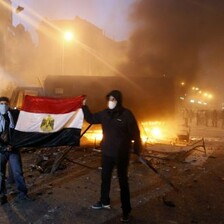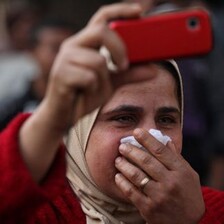The Electronic Intifada 28 January 2011
CAIRO (IPS) - Twitter was an early casualty. Then Facebook access became spotty. But when the Internet itself went down, Egyptian pro-democracy activists knew their protests were having an effect.
This report was dictated on landline phone from Cairo to the IPS office in London.
“The government shut down the Internet to keep us from telling the world about what’s really happening here,” says Sherif Gomaa, a cafe employee protesting in downtown Cairo.
Demonstrations calling for the ousting of Egyptian President Hosni Mubarak entered their fourth day Friday, and show no sign of letting up. At least four persons have been killed and hundreds injured since the “Day of Anger” protests began 25 January.
The nationwide protests, inspired by the popular uprising in Tunisia earlier this month, are the largest anti-government demonstrations that Mubarak has faced during his repressive 33-year rule. More than 1,200 protesters have been arrested, according to local rights groups.
Egyptian authorities have earlier denied interfering with communication services.
“The government would not resort to such methods,” Cabinet spokesman Magdy Rady told news agencies Wednesday. He added that the Egyptian government respected freedom of expression, and would ensure open channels.
Activists claim the government began disrupting Internet services on 25 January to prevent protesters from using social networking sites to coordinate anti- regime demonstrations and report on clashes with police. The service disruptions grew in size and scope as protests continued.
The government, which controls all Internet access, reportedly blocked several privately-owned Egyptian news websites known to be critical of the regime.
Twitter, a popular communications tool for youth activists, and Bambuser, a Swedish live video streaming site, confirmed that their websites have been blocked in Egypt since Tuesday. Facebook initially said it had not noticed any major traffic change from Egypt, but later confirmed its service blocked too.
One activist said the censorship had been anticipated, and Egyptians were using “proxies” to circumvent the blocked websites. On Thursday morning, as protests continued to flare up across the country, DSL subscribers began reporting widespread Internet outages. Some ISPs continued to operate with very slow connections, but by 11pm, all Internet traffic had come to a standstill.
A technician at one ISP said that the government had ordered a nationwide service disruption, and offered no timetable as to when service would be resumed.
It is the first time for the Egyptian government to cut all Internet traffic in response to social unrest.
Ramy Raouf, a digital rights expert, told IPS in November that the Egyptian government had successfully positioned the country as a regional IT hub and developed its call center operations and online business advertising.
“The government has been reluctant to censor any website or cut Internet services because in doing so it would send a bad message, and would lose a lot of money,” he explained.
The timing of the Internet blackout was crucial. It came as activists were attempting to stream video of brutal police action against protesters, and to coordinate plans for nationwide protest to follow Friday prayers. Various opposition groups, including the banned Muslim Brotherhood, intended to join the demonstrations.
Activists first declared 25 January as a “Day of Anger” on Facebook and Twitter, and used the social networking sites to garner support. More than 80,000 people joined the Facebook group saying they would participate in the protests.
Interior Minister Habib El-Adly initially dismissed the online campaign as ineffective, but the government appeared surprised by the tens of thousands of Egyptians who took to the streets, despite a heavy police presence.
“We’ve proven that online activism can be turned into street action,” boasted Mohamed Abdel Moneim, who was among the estimated 15,000 protesters in Cairo’s Tahrir Square on 25 January. “It started on Facebook, but then it snowballed into something much bigger.”
Early Friday all mobile phone services and live satellite television feeds were cut. Only landline phones and fax communication remained.
“What the regime is facing is not the result of the social network revolution but rather the results of its corrupted, stupid policies in the past thirty years,” Egyptian blogger Zeinobia wrote.
Hours later the blog went silent.
All rights reserved, IPS — Inter Press Service (2011). Total or partial publication, retransmission or sale forbidden.
Related Links





